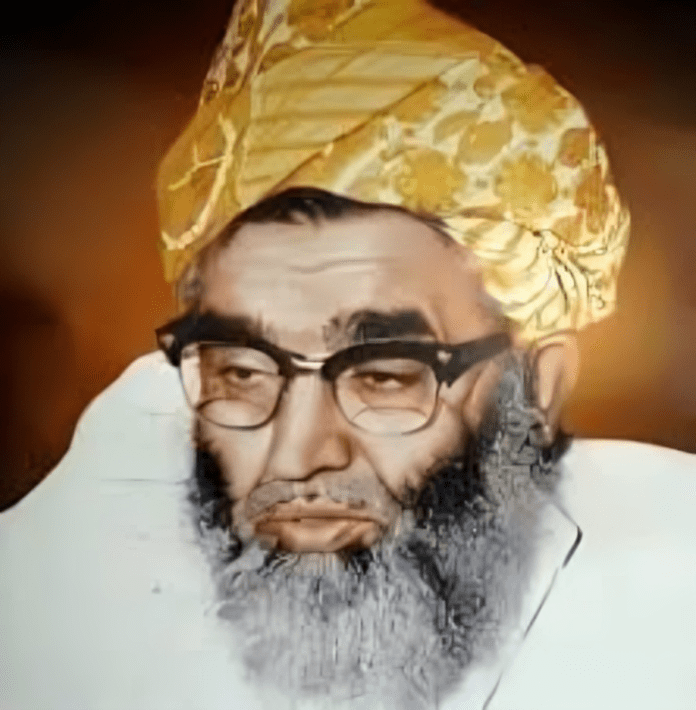Mufti Mehmood was born on January 1919 in Paniala, District Dera Ismail Khan (N.W.F.P.). He acquired his religious education from Jamia Qasimiya in Muradabad. During 1937 elections was a campaigner of Jamiat-ul-Ulama-e-Hind. After completion of his education in 1941 he served as a teacher in Isa Khel Mian Wali till 1944. During the ‘Quit India’ movement in 1942 against the British, Mufti Mahmood took part in the campaign on behalf of Jamiat-ul-Ulema-e-Hind. He was not only an elected Member of its Majlis-e-Amila but also Councilor the party. In 1950, he got a teaching job in Madrassa Qasim-ul-Uloom in Multan. Later on, he served at positions of chief Mudarras, In charge of Education, Chief Mufti, Sheikh-ul-Hadith, and Muhtamim. As a Mufti, he passed on at least 25,000 Fatawa.
Mufti Mahmood took an active part in Tahreek-e-Khatm-e-Nabuwwat in 1953. Being deadly against Ayub Khan’s One Unit Scheme, he was arrested in 1956. In April 1962, he took part in the elections for the National Assembly Seat for the first time under Basic Democracy Program and defeated all the opponents. On 14th July 1962 when law was passed to re-instate all the Political Parties, Mufti Mahmood took charge of Jamiat-Ulema-Islam as Qaim Maqam Ameer and in 1963 he became its Naib Ameer. He was critical of family planning and other policies of Ayub Khan government. Mufti Mahmood was one of the central leaders of “Jamhoori Majlis-e-Amal” that was formed in Dacca by Pakistan’s political parties in Dacca on 8 January 1968. Then in May 1970, Pakistan’s 18 religious and political Parties formed a “Muttahida Deeni Mahaz” whose President was Mufti Mahmood. In December, Elections were held and Mufti Mahmood gained a landslide victory against Zulfiqar Ali Bhutto in the Dera Ismail Khan constituency.
On 26 March, the three main political parties made an agreement that was signed by Z. A. Bhutto from PPP, Abdul Wali Khan from NAP, and Mufti Mahmood from JUI. On 1 May, Mufti Mahmood took oath as Chief Minister of the NWFP. During his tenure as Chief Minister he took introduced many reforms: Forbidding Alcohol; announcing Urdu as Official Language in Government offices; forbidding western dress in the Government Departments, implementing Jahaiz Act, Ban on Betting; making nazira (reading of Quran) a pre-requisite for admission in educational institutions; Enforcing Pardah; Ramazan Ordinance; Ban on Interest; Friday as Holiday and formation of a Board for formalizing Islamic Laws. He was quite efficient and strict in his administration but in 1973, he resigned from his position of chief minister as a protest against the unfair dismissal of the Balochistan Government. In the same year, various political parties of Pakistan formed a coalition of the “Muttahida Jamhoori Mahaz” in order to combat the undemocratic and autocratic ways of Bhutto. Mufti Mahmood was appointed as its Vice-President. Thus Mufti Mahmood played an important role in civil disobedience movement against the Bhutto government.
On 30 June, 137 members of the National Assembly proposed a resolution demanding to declare Qadianis as non-Muslims and Mufti Mahmood’s name was at the top of the list. During Bhutto era and later in Zia regime he actively worked for enforcing Nizam-e-Mustafa in the country. In 1979, when Russians attacked Afghanistan, Mufti Mahmood issued a fatwa for Jehad against the Russians and the puppet regime in Afghanistan. In 1980 he expressed his confidence in General Zia ul Haq’s Islamization but later issued a fatwa against the deduction of Zakat from the salaries of the Government servants. He also established the MRD in the same year.
He died on October 14th 1980 while he was addressing Ulama in the jamia at Binori Town. He was buried in Dera Ismael Khan.
This article was last updated on Monday, Jan 05, 2009






